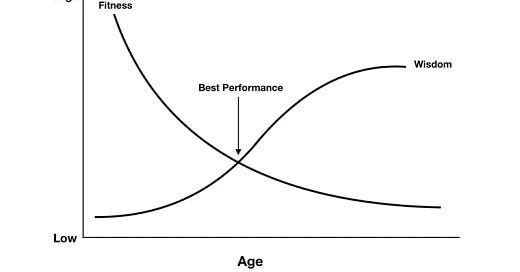Your Greatest Strength is Your Greatest Weakness
"Too Soon Old, Too Late Smart: Thirty True Things You Need to Know Now" -- and other wisdom from Gordon Livingston
My wife and I have a conscientious child who tips into perfectionism, a laid-back child who has trouble keeping track of things, and a fearless child who leaps—literally—without thinking.
Meticulous, calm, bold. Fussy, lazy, destructive.
How do we lean into our strengths for good and away from when those strengths go bad?
There is a lot of truth in the adage—your greatest strength is your greatest weakness. That famous quote is attributed to Gordon Livingston, a psychiatrist, and author. Livingston is best known for the 2004 bestseller "Too Soon Old, Too Late Smart: Thirty True Things You Need to Know Now.”
Livingston is also the author of many fantastic one-liners that inspire a better path for living, such as:
“The perfect is the enemy of the good.”
“Any relationship is under the control of the person who cares the least.”
“Forgiveness is a form of letting go, but they are not the same thing.”
“The three components of happiness are something to do, someone to love, and something to look forward to.”
“We are responsible for most of what happens to us.”
“Our feelings depend mainly on our interpretation of what is happening to us and around us—our attitudes. It is not so much what occurs, but how we define events and respond that determines how we feel. The thing that characterizes those who struggle emotionally is that they have lost, or believe they have lost, their ability to choose those behaviors that will make them happy.”
“Only bad things happen quickly, . . . Virtually all the happiness-producing processes in our lives take time, usually a long time: learning new things, changing old behaviors, building satisfying relationships, raising children. This is why patience and determination are among life’s primary virtues. ”
Livingston’s lessons help us chart a course toward introspection to help us live more satisfied and meaningful lives.
My fellow podcast host, Kelley Weber, is a spiritual director who specializes in working with those who feel outside traditional religious settings yet still long for connectedness to a deep spiritual life—she is also a student of Enneagram teacher Marion Gilbert.
Enneagram is similar to many personality typing tests, but it also describes patterns in how people interpret the world and manage their emotions. I’ve had the opportunity to participate in one of Kelley’s Enneagram sessions (I am a Seven, by the way). And one of the most intriguing aspects of this philosophy is that it does not just analyze who you are at your best but also who you are at your worst and who you are in growth—all keys to introspection that moves you toward a more balanced life.
Sevens are extroverted, optimistic, and spontaneous—they tend to be playful, high-spirited, and practical. At their best, Sevens assimilate experiences deeply, making them grateful and appreciative for what they have—awed by the simple wonders of life. At their worst, Sevens become unfocused, indulgent, and escapist.
Sevens in growth chase stimulus less, are more focused, channel moderation, and can happily spend time alone. You can find free tests online if you are curious about your number and its meaning.
Now, I don’t believe Enneagram is the end-all-be-all; I think it serves a similar purpose as Myers-Briggs or a DISC assessment. Still, I like the idea of a program encouraging people to take some devoted time to pull back and observe themselves from a different vantage point. Sometimes, we all just need to pause and reflect.
In the spirit of Livingston, I’ve been pondering what smart things have come to me late—those insights that come with getting some life experiences under your belt: the good ones and the bad ones.
Here are some of those late lessons that I now think about frequently:
Small things often — this is the path to building lasting meaning in anything.
We are what we think about. The conversation we have in our heads creates the reality we inhabit, or as Oliver Burkemann would put it, “Attention … is life: your experience of being alive consists of nothing other than the sum of everything to which you pay attention.”
Framing matters — do we think of our daily actions as things we have to do, or things we get to do.
Deep contentment comes from being able to find awe in everyday things.
I’m interested in continuing this discussion, so I am seeking some audience engagement on this one. If you feel so inclined, shoot me a note with some of those lessons you have to come late, but would have been good to know earlier. If I get some good ones, I’ll share and explore them in a future post.
Happy Friday everyone,
Erin





